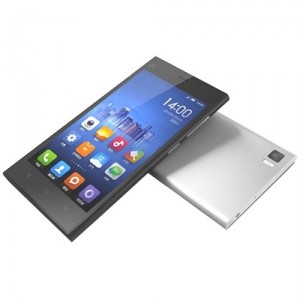Chinese company Xiaomi’s recent unveiling of its Mi 4 smartphone has brought accusations that the device is a direct copy of Apple Inc.’s (NASDAQ:AAPL) iPhone, a charge that the Mi 4’s designer vigorously denies. Two days after Liu Jun, CEO of Xiaomi, took to the stage in a joke-riddled yet informative presentation of the new device, Hugo Barra, the designer who actually devised the Mi 4’s look and configuration, states that the smartphone was inspired by the iPhone but does not copy it.
Mr. Barra, the Global Vice President of Xiaomi, presents an argument that the current patent laws are “stupid” because they do not permit competitors to improve on existing designs. The current Mi 4 bears a strong, though not exact, resemblance to the iPhone 5, and features such premium characteristics as a metal rather than plastic case which again recalls the design paradigms of Apple (AAPL) more than Samsung.
 Though the Mi 4 might run afoul of Apple’s lawyers were it to venture into western markets, it is currently being confined to regions where American patent law holds either tenuous validity or none at all. Xiaomi’s telephones are currently being sold mainly in China and India. The smartphone manufacturer, which has built a multi-billion dollar niche for itself in just four years, is taking aim at such potential cash cows as Russia, Indonesia, and Brazil, Mr. Barra says.
Though the Mi 4 might run afoul of Apple’s lawyers were it to venture into western markets, it is currently being confined to regions where American patent law holds either tenuous validity or none at all. Xiaomi’s telephones are currently being sold mainly in China and India. The smartphone manufacturer, which has built a multi-billion dollar niche for itself in just four years, is taking aim at such potential cash cows as Russia, Indonesia, and Brazil, Mr. Barra says.
With an affordable price point under $400 and good quality, the Mi 4 is something of a natural for these markets. Xiaomi has made several notable sales records this year. Though the sales have a whiff of the publicity stunt about them, they are still indicators of demand and show that the Beijing electronic manufacturer has a product that people in its target markets are willing to buy.
Two days ago, on July 22, 2014, Xiaomi sold out 100,000 Mi 3 smartphones in 38 minutes and 50 seconds in India. Apple Inc. was aiming at 1 million iPhone sales for the subcontinent for the whole fiscal year of 2014, so the Chinese firm’s successful maneuver sold 10% of Apple’s sales target for a whole 365 days in less than an hour. Earlier this month, it sold 50,000 MiPad tablets in less than 4 minutes, though this was in its home country of China, where patriotism-fueled enthusiasm for the homegrown company is predictably high.



